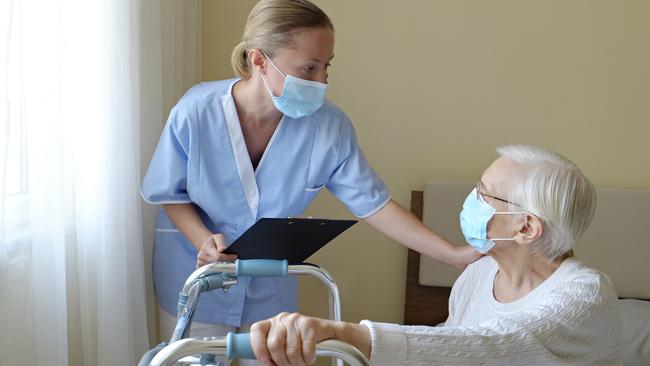Aged-care nursing boost ‘behind schedule’, report warns
A modest gain in aged care nursing minutes in the last year is again raising the issue of bringing in qualified nurses from overseas.

Progress to attract nurses into aged care to meet the Albanese government’s new minimum mandated care minutes for all residents has been modest in the past year and will need a “dramatic acceleration” to meet the October deadline, a new report warns.
Adding to that concern is that extra nursing care delivered into homes in the past year was mostly provided by agency staff, which tends to compromise care quality as nurses have less opportunity to forge relationships with residents, it finds.
The study – from Australia’s largest independent not-for-profit aged-care provider Bolton Clarke – states that while recent data from providers has revealed the level of nursing care that residents are receiving isn’t as low as initially believed, the trajectory of the path toward the required 40 minutes per resident per day will not get the sector there by the target date of October.
Report author Tim Hicks, Bolton Clarke’s executive general manager policy and advocacy, said this should motivate the federal government to help the sector push harder to source nurses from overseas.
Mr Hicks’ report concludes that while higher pay for aged-care nurses introduced this year by the government has helped somewhat with recruitment, there is still heavy competition from other parts of the health economy.
“The lack of progress throughout the year is perhaps cause for pessimism in the sector being able to achieve the target in the six months that remain between the latest published data for March on the targets becoming mandatory in October,” the report states.

“The rate of increased staffing will need to accelerate dramatically to meet the October 2023 deadline for staffing targets.”
To implement one of the key recommendations the aged care royal commission made in its final report in March, 2021, the federal government raised the amount of care minutes, including nursing care, for residents in aged care.
Those minimum requirements – 200 minutes of overall care per resident per day, including 40 minutes from a registered nurse – become mandatory from next month.
They increase to 215 minutes, including 44 registered nursing minutes, from October next year.
Government figures released in August show residential nursing homes are averaging 190 direct care minutes, including 33 RN minutes – a two-minute increase for nursing minutes from the previous year and a two-minute overall increase in care minutes.
Some providers, especially those operating in regional areas where nursing stocks are low, have expressed concern about not being able to meet the requirement, given the government had incorporated mandatory care minutes as part of licence conditions.
The government and the aged-care regulator have placated concerns that homes would be shut down if they were failing to meet the care-minute requirements by October. They must, however, be able to show they are taking all possible steps to do so.
“There is a good news, bad news story in the data,” Mr Hicks said. “The good news is that hiring personal care workers is getting easier, registered nursing staff levels are higher than we thought, and better pay is helping a lot.
“The bad news is that progress is slower than it initially appeared to be, and a lot of the extra staffing has come from agency suppliers.
“We should not be afraid of ambitious targets but at a sector level we should be looking at ways to further boost supply, including pushing harder on migration,” Mr Hicks said.
He noted any push to recruit nursing staff from developing countries in the region should involve supporting more nursing training programs rather than simply stripping them of their available nursing workforce.
A program funded by Germany in the Philippines had led to a win-win in terms of training new nurses to work overseas, Mr Hicks said.







To join the conversation, please log in. Don't have an account? Register
Join the conversation, you are commenting as Logout